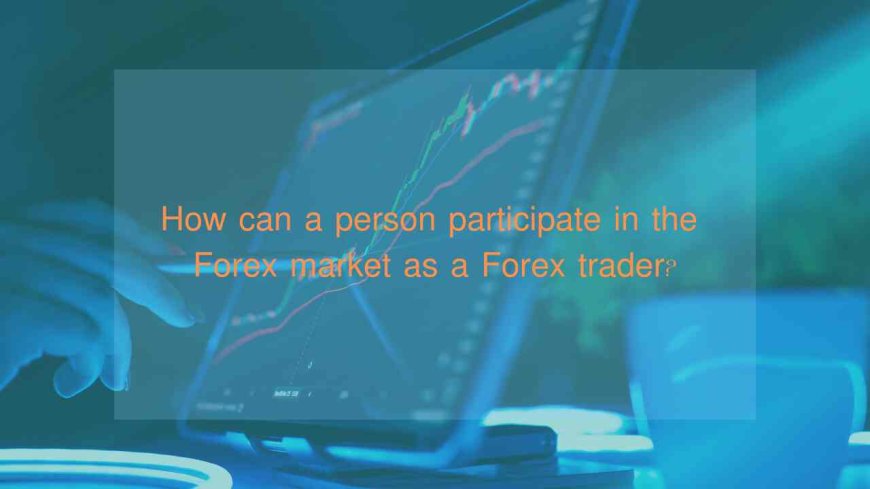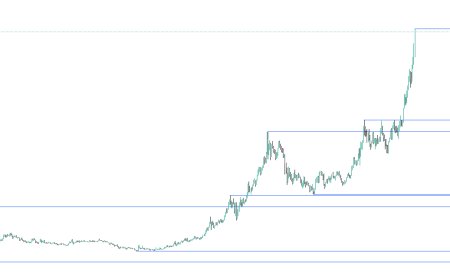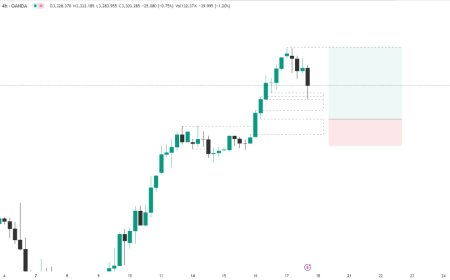How can a person participate in the Forex market as a Forex trader?
The reason why Forex trading is so popular is that different systems have been introduced to everyone at different times. We can call these financial instruments. Financial instruments are retail forex, spot FX, currency futures, currency options, currency exchange-traded funds (or ETFs), forex CFDs, and forex spread betting etc.

How can a person participate in the Forex market as a Forex trader?
We have already received many ideas about the Forex market. In today's article, we will learn how to participate in it as traders.
The reason why Forex trading is so popular is that different systems have been introduced to everyone at different times. We can call these financial instruments. Financial instruments are retail forex, spot FX, currency futures, currency options, currency exchange-traded funds (or ETFs), forex CFDs, and forex spread betting etc.
Today, we will learn about these financial instruments in detail.
Currency Future:
Currency futures are an agreement to buy or sell a specific asset at a specific price and on a specific date in the future.
Currency futures are contracts that allow a currency to be bought or sold at a specific price and on a specific date for the exchange of the currency.
Currency futures were created by the Chicago Mercantile Exchange (CME) in 1972. Since futures trading is conducted in a centralized market, this market is very transparent and natural. It is easy to predict the prices and transactions of this market.
Currency Options:
An option is a financial instrument that gives the buyer an option but no obligation. The option to buy or sell an asset at a specific price on the expiration date of this option is called “option trading”.
If a trader sells an “option”, he will be obligated to buy or sell an asset at a specific price on the expiration date of the option.
Currency options, like currency futures, are traded on the Chicago Mercantile Exchange (CME), the International Securities Exchange (ISE), and the Philadelphia Stock Exchange (PHLX) marketplaces.
However, one of the problems with trading FX “options” is that the market is limited to specific “options,” and the liquidity is quite low, so options trading is not very profitable.
Currency ETFs:
Currency ETFs are offered in the form of a single currency or a basket of currencies.
Currency ETFs provide exposure to the foreign exchange market through specific funds without the need for ordinary investors to invest.
Currency ETFs are very profitable because their liquidity is very strong.
Visit this link to learn about currency ETFs. Link
Currency ETFs are funded by various financial companies. When a currency ETF is completed, it is offered as shares to ordinary investors through the exchange.
Although currency ETFs are quite profitable, they also have some negative aspects. For example, this market is not open 24 hours a day, and its trading costs are very high.
Spot FX:
The spot FX market is an "off-exchange" market, also known as the over-the-counter (“OTC”) market.
The off-exchange forex market is a large, growing, and liquid financial market that operates 24 hours a day.
In reality, the spot FX market is not like a traditional market. It does not have a trading location or exchange.
In the OTC market, an investor transacts business directly with his or her counterparty.
In contrast to currency futures, currency ETFs, and currency options, there is a central market. Spot FX, on the other hand, are over-the-counter contracts that are intended to be a physical contract between two parties.
Most trades are conducted over electronic trading networks (or telephones).
The primary market for FX is the "interdealer" market. Where FX dealers transact business with each other. An FX dealer is a financial intermediary who is ready to buy or sell currencies with their clients at any time.
The interdealer market is also known as the "interbank" market due to the dominance of banks as FX dealers.
The interdealer market is only accessible to institutions that trade in large volumes and have the ability to invest in very large amounts.
These include banks, insurance companies, pension funds, large corporations, and other large financial institutions that manage the risks associated with currency rate fluctuations.
In the spot FX market, an institutional trader is buying or selling a contract or agreement to supply or deliver a currency.
A spot FX transaction is a bilateral (“between two parties”) agreement that effectively completes the exchange of one currency for another.
It is a contract. This means that this spot contract is a binding obligation to buy or sell a specific amount of foreign currency at the price of the “spot exchange rate” or current exchange rate.
So, if you buy EUR/USD in the spot market, you are trading a contract that states that you will receive a certain amount of euros in exchange for US dollars at an agreed price (or exchange rate).
It is important to note that you are not trading the underlying currencies themselves, but a contract involving the underlying currencies.
Although it is called “spot”, its transactions are not settled exactly “on the spot”.
In reality, when a spot FX trade is made at the current market rate, the actual transaction is not settled until two business days after the trade date.
This is called T+2 (“Today plus 2 business days”).
This means that delivery of what you buy or sell should be made within two business days and is referred to as the value date or delivery date.
For example, a company buys EUR/USD in the spot FX market.
The entry is opened on Monday, and the trade closes on Wednesday. Here, one of the values is Wednesday. This means that it will receive its euros on Wednesday.
Not all currencies settle on T+2, however. For example, the USD/CAD, USD/TRY, USD/RUB, and USD/PHP value dates are T+1, meaning they move one business day ahead of today (T).
Ordinary traders do not have the opportunity to participate in the actual spot forex market.
Retail Forex:
There is a secondary OTC market where trading opportunities are provided for ordinary and small investment traders.
A general or retail forex trader will get an opportunity in this market through a “forex trading provider”.
Forex trading providers trade on your behalf in the primary OTC market. This forex trading provider collects a small price from the market at a certain price and adds a “markup” to this price. Markup is the additional price of the bid and ask price.
For example, suppose a shopkeeper buys an egg at a wholesale price of ten taka and sells it to the general public for twelve taka. Here, the shopkeeper has added a markup of two taka.
Forex trading providers also add a markup to their displayed prices in the same way. For example, the liquid price EURUSD Bid 0.10000 and Ask 0.10000 is the price purchased by the Forex Trading Provider. The Forex Trading Provider adds a mark-up or spread to it. For example, Bid 0.10002 and Ask 0.99080
This is how the spread is created. I hope this is clear.
Forex Trading Providers are primarily known as Forex Brokers. Although the word broker means a broker, in reality, the role of a Forex Broker is to mediate between buyers and sellers. However, in some cases, the broker can also take a position as an option.
Although spot Forex contracts usually require delivery of currency within two days, in reality, no one delivers any currency in Forex trading.
Running entry positions are “rolled” on the delivery date. This happens especially in the retail Forex market.
Remember, you are trading a contract to deliver the underlying currency rather than the currency itself. This is not just a contract, it is called a leveraged contract.
Retail forex traders cannot “take or make delivery” on leveraged spot forex contracts.
Leverage allows a trader to control a very small amount of currency.
Retail forex brokers allow traders to trade with leverage, which allows a trader to open an entry position at a price 50 times higher than the initial required margin amount.
So with $2,000, you can take a EUR/USD entry position worth $100,000.
But if we don’t use leverage, we would have to pay $100,000 worth of euros to take a EUR/USD entry position.
Since the trader only has $2,000 in his account, he will be unable to settle the contract in cash. You will not have enough funds to cover the transaction!
So you have to close the entry position before it settles or “rolls” it.
To avoid this hassle of real supply, retail forex brokers automatically “roll” clients’ entry positions.
This way, you can avoid being forced to accept (or deliver) 100,000 euros.
When a spot forex transaction is not physically delivered, it simply remains open indefinitely until the trade is closed. This is why it is known as a "rolling spot forex transaction" or "rolling spot FX contract". In the US, the CFTC calls it a "retail forex transaction".
Retail forex transactions are closed by entering into an equal but opposite transaction with your forex broker.
For example, if you bought British pounds with US dollars, you would close the trade by selling British pounds for US dollars.
This is called offsetting or liquidating the transaction.
If you have an entry position open at the end of the trading day, it will automatically roll over to the next value date to avoid currency delivery.
Your spot contract will automatically roll over for you indefinitely until your retail forex broker closes it.
The method of rolling a currency pair is known as Tomorrow-Next or "Tom-Next", which stands for "tomorrow and the next day".
When an entry position is rolled over, the broker charges a fee for the rolling.
These charges are known as rollover fees. Your forex broker will calculate the fee for you and debit or credit your account balance.
Retail forex trading is considered speculative. This means that traders are trying to profit from the trade by "speculating" on exchange rate movements. They are not taking physical possession of the currencies they buy or sell, or by delivering or delivering the currencies they sell. Their sole purpose is profit-taking.
Forex Spread Bet:
A spread bet is a derivative product, meaning you do not take ownership of the underlying asset but rather speculate on whether you think its price will move up or down.
A forex spread bet enables you to speculate on the future price direction of a currency pair.
In a spread bet, the price of a currency pair is "derived" from the price of the currency pair in the spot FX market.
Your profit and loss are determined by how far the market moves in your favor before you close your entry position and how much money you bet per "point" of price movement.
Spread betting in Forex is provided by "spread betting providers".
Unfortunately, if you are in the United States, spread betting is considered illegal for you. Although regulated by the FSA in the United States, the United States considers it to be internet gambling, which is currently prohibited.
Forex CFD:
A contract for difference (“CFD”) is a financial derivative. Derivative products track the market price of an underlying asset so that traders can speculate on whether the price will rise or fall.
The price of a CFD is “derived” from the price of the underlying asset.
A CFD is a contract, usually between a CFD provider and a trader, where one party agrees to pay the other the difference in the price of a security between the opening and closing of the trade.
In other words, a CFD is essentially a bet with a CFD provider on the up or down of a particular asset, and you agree that whoever wins the bet will win. And whoever loses will pay everything.
A Forex CFD is an agreement ("contract") that is in effect from the time an entry position is opened to exchange the difference in the price of a currency pair until that entry position is closed.
The CFD price of a currency pair is "derived" from the price of the currency pair in the spot FX market. (Or at least it should be.
A Forex CFD allows a trader to take both buy/sell entry positions. A trader can take both long and short entry positions if they wish.
If you buy and the market price moves against you, you can close or hold your running entry position if you wish.
EU and UK regulators have decided that "rolling spot FX contracts" are different from traditional spot FX contracts.
The main reason is that with rolling spot FX contracts, there is no intention to take actual physical delivery ("take ownership") of a currency; the purpose is simply to speculate on the price movement in the underlying currency.
The purpose of trading a rolling spot FX contract is to gain exposure to price movements without having to hold the underlying currency pair.
So, to clarify this distinction, a rolling spot FX contract is governed as a CFD. (In the US, CFDs are illegal, so it is known as "retail forex trading").
Forex CFD trading is provided by "CFD providers".
Outside the United States, retail forex trading is usually done with CFDs or spread bets.
What's Your Reaction?
 Like
0
Like
0
 Dislike
0
Dislike
0
 Love
0
Love
0
 Funny
0
Funny
0
 Angry
0
Angry
0
 Sad
0
Sad
0
 Wow
0
Wow
0
















